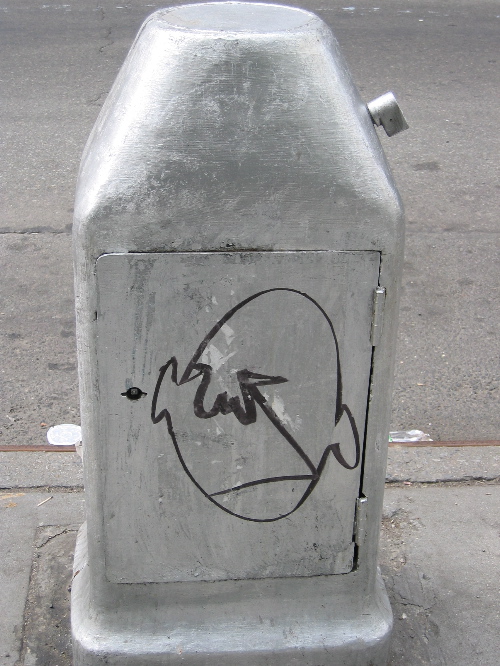August 27, 2004
LEE'S TRIP

Jessica Hopper with a little art update:
"Lee Bontecou is a lady sculptor, a contemporary of all the drunken New York men whose names we know, the one ones who've already had movies and documentaries about their art. She thought it was all retarded (again with that word!) and sometime shortly after Vietnam, she was like "f this" and reclusiated. (Made that one up.) She just had her first retrospective in, like, 30 years here in Chicago at the MCA. She did these canvas/steel constructions, big squares that looked like a war/womb/topographic relief map made of things you would find in a DMZ: heavy brown and army green canvases and huge industrial zippers buckling and contouring. They're the only sculptures I have ever seen that truly evoke sadness and anger over war. Scroll down and there is a longer bio and a picture of the stuff I am talking about here.
This is prolly her most famous piece. It's huge—maybe 15 feet by 5 feet. It's a relief, lit from within, and it looks like a seashell made from paper."
EEW! THE INTERNET!

I can't shake my pom-poms hard enough for I Just Can't Stop It and Wha'ppen? I am beginning to think that whole 78-72 English/Jamaican thing is my secret dilithium crystal. Beginning to think? No. I've thought it a million times. But it's remained true, tangibly, over time, unlike my six million other generalizations.
ADVENTURES IN PARENTING (BRIXTON RE-LICK EXTRA PRESSURE SNARES REMIX)

“Can we hear ‘Dark of the Manatee’ again?”
“‘Dark of the Matinee’?”
“Yes, that one.”
“No, no, no, no. No. Dad. No. Do ‘We are Devo’!”
“Next.”
[Plays song.]
“Dad, this part sounds like your band, the one Clem and Wilbo were in.”
[Stunned silence.]
“You remember what we sounded like?”
“OK, not now, not now, with the ‘white finger’ part.”
[Listening.]
“I can’t hear it.”
“It’s loud enough.”
“Dad, I like ‘Dark...of...the...Matinee’ more than Junior Senior and Devo COMBINED. But just the chorus, just that part. That’s the part I like more than Junior Senior and Devo combined.”
“Dad? Do you know that when I fart sometimes, it’s like thunder?”
[Music drowned out by howling.]
LADIES AND GENTLEMEN...

I give you the CEO of Sticker Shock. You'll have to wait until September 13th to find out what that means, but you don't have to wait a second longer for baseball, violence and anti-mentoring. The most gully teacher in Cambridge, number 24, Hua Hsuuuuuuuuuuuuuuuuuuuuuuuuuu:
"The summer between my third and fourth years of college, I accepted a summer job teaching writing, math and history at the Richmond Youth Project. I had spent a lot of time there the year before as part of a mentorship program and I welcomed the idea of a summer job consisting of big brotherly tasks like taking sixth-graders to see The Player’s Club, or scolding them about drug or gun use.
The summer turned out to be a truly terrible one, for reasons I won’t get into here.
The months grew very taxing and I limped toward the finish line. Whatever sassiness I could muster was directed at the students, who had challenged the staff to a baseball game on the last day of classes. This would be the perfect way to close my summer: I would redeem my spirit on the diamond.
The big day came, and after a night spent visualizing positive things, everything was lining up perfectly. We entered the eighth inning trailing by a run, and I was first up. I had played a solid but unspectacular game with a pair of singles and an error-free performance in the field. But this was crunch-time, and when my team needed me the most, I rapped a groundball to second. I’d like to say I lined it, or that the students had put on the over-shift, or that it was at least sharply hit and short-hopped the second baseman, but it just sort of moseyed toward the dirt, harmless and impotent. I busted tail up the line, conscious that I had just bragged to the program administrator that I would be standing on third when he came to bat.
“I’m going to hit a triple, no matter what. Yeah. That’ll look good in the box-score: a triple.”
“Okay.”
“It’s the hardest hit in baseball.”
“Ah.”
“So knock me in, I’m going to be in scoring position. We need to put up a crooked number this inning.”
“I don’t know what you’re talking about.”
“We need the runs.”
“I’ve never played baseball before.”
Luckily, the second baseman, like many of the other people at this baseball game, had never played baseball before either, and he threw wide. I took a liberal turn around first and arrogantly ran through second base: Fuck it, I was going to leg out a triple—I was going to make them make the play. As I strode toward third, thinking to myself how fantastic John Fogarty’s “Centerfield” sounds at a ballpark, and how heroic it would be if this very song played as I rocked a perfect pop-up slide into third, clapped the dust from my hands, pointed at the dugout and shouted, in the simplest language possible, for the administrator to take us home.
As I thought about the imaginary pat on the butt the imaginary third base coach would soon be giving me, I saw something: It was the ball. The ball soon passed me. I was soon running as fast as I could, trying to catch the ball. I sized up the third baseman, one of my brightest, toughest students. The thing is, Mindy, who was then thirteen, was not what one might consider an athletic girl. And considering she had been tossing the glove into the air during my at-bat, it’s safe to say she was probably more surprised than I was that the ball was coming toward her. I made a decision: I’ve put a lot of good hours into these kids, and who would I be to teach them that life is easy or fair, or that one should trust authority. Sometimes, shit happens. Teachers flip out. Cops harass you for no reason. Parents go off. Your twenty-something mentor comes running at you, spikes up, ready to kick the ball out of your mitt. At least I’m not wearing spikes, I assured myself, so I’m going to kick the ball out of Mindy’s mitt. The throw beat me by a good five feet and I went into a premature slide. Mindy stooped awkwardly to receive the ball, similar to the way one might clean up after a dog: Her body was completely stiff and upright, and she was looking the other way, her face striking a disgusted scrunch. By now, my knee was completely torn up (the field we’d been using was more suited for crime, joint-smoking and glass-breaking than baseball) but I eyed Mindy’s extended mitt and gave a swift kick. Sure enough, I connected with her hand, but then again, I was already bleeding, so I figured I’d already suffered my own debt. The ball dribbled out of her glove, I tackled this twelve-year-old girl to the ground, mouthed the word “Sorry” (in my head), stepped on third and went into a slow, one-flap-down trot toward home. I defiantly slammed home plate with my right foot and lamely threw my arms in the air. I noticed that my clothes were covered in dust and blood. I also noticed that none of my teammates had come to greet me after this most unlikely (and totally genius, you have to admit) inside-the-park home-run. Rather, my teammates (administrators, teachers, other mentors) stood there in shock. My boss’ mouth was agape; she seemed too terrified to be angry. The other teacher tried to disguise her disgust with a frightened smile. She tried to clap but her hands just sort of hung in the air. Other adults were covering their faces. The students cackled, since most of them loved violence.
We would eventually win the game, because the students let us. Mindy turned out to be fine. Like I said, she was tough, and I’d like to think she was even tougher after our little run-in at third. I strolled back to the dugout, wondering if it was the dirt or the broken glass that had ripped open my knee. Eventually, a huge, gruesome, lunchmeat-sized scab formed on my knee, and I wore that shit like a badge. A month later, the scab decided to go solo, floating into the warm waters of the Gulf of Mexico, and I felt a lot better."
August 26, 2004
BUYING THE INFRASTRUCTURE OF THE INTERNET FOR .05 CENTS ON THE DOLLAR? A STEAL. LAUGHING AT WALL STREET? PRICELESS.

When they don't involve corporations subcontracting countries to subcontract corporations to subcontract armies to prepare new markets (a.k.a. "securing the perimeter"), the failures of the free market are some entertaining shit.
August 25, 2004
DON'T GET TOO DEEP BECAUSE YOU MIGHT GET LOST

The new Prodigy album is as fruitfully back-to-core-strengths and punch-in-the-stomach as the new Fatboy Slim album is pathetically drowning-not-waving and $15-dollar-margarita-out-of-a-bottle. A Prodigy remix album done by bootleg guys was temporarily available for free, but no longer. Don't fret: it contained decent work from Pop Razors and cry.on.my.console, but trading the crass force of the originals for mousey detail is the dictionary definition of "Holding Tool By Wrong End."
ADVENTURES IN PARENTING (RADIO EDIT)

“Is today Crazy Hair today?”
“Yes. You read that thing yesterday.”
“Right. Well, your hair looks kind of crazy right now.”
“No, Dad. Not bedhead or born hair. It needs to be gel or something.”
“Wait, let’s try something. Come here.”
[Soap and water mixture, hands, patient child.]
“Is it going to stick up?”
“Well, your hair is curly and doesn’t want to stick up. Let’s just put some more on.”
“Can I just dry it off? It’s not working.”
“Yeah. We’ll get you some gel at CVS. You’ll just be a little late.”
[In the car, “The Dark of the Matinee” comes on. I switch it, but there is protest.]
“No, leave it. I like that music. What is it called?”
“‘The Dark of the Mat-i-nay.’“
“‘Dark of the Matay’?”
“‘Mat-i-nay—it’s when you see a movie in the middle of the day.”
“I like it. It sounds like the Beatles.”
“Where?”
“Right here. This is the chorus. It gets louder and they say the real name of the song. I wanna hear it again.”
[Long-suffering brother removes thumb from mouth.]
“No, ‘Whip It’!”
“After we drop him, we’ll switch to Devo.”
[Nods, replaces thumb.]
“OK. Stay in the car, I’ll be right back.”
[Grabs tube that says “spiky.”]
“OK. Let’s try this.”
“Can you make it a mountain like Tristan in Yu-Gi-Oh? His hair was born like that.”
“Wow. Your hair is really really curly.”
“Will it stick up?”
“Maybe after it’s been in the sun.”
“Dad?”
“Yes?”
“Can we just put colors in my hair next time?”
“Sure.”
“Play ‘Girl U Want.’“
[Long-suffering brother takes thumb out of mouth.]
“No! ‘WHIP IT’!”
“OK, Dad, but then play ‘Girl U Want,’ please.”
[Nods, replaces thumb.]
August 24, 2004
LIGHT & DARK

Saw thee mightee Keren Ann last night. All seltzer and sugar and fumes. Dude, I was lifted. "None of these are love songs," she pointed out. Don't come back later and tell me it's too lightweight—you nail that pommel horse routine and then tell me becoming light is easy. Bwah.
August 23, 2004
UNREAL IS HERE

After the war against numbers—extremely Deleuzian of the Bush puppets—will come the war against time, wherein Wolfowitz enlists Rumsfeld's poetry of contradictions and convinces Bush to convince the public that it is always Tuesday with Morrie, thereby freezing the length of the war and preventing it from dragging on.
August 22, 2004
August 21, 2004
TO DO LIST
Magnificent day. I started by cleaning madly, which restored some missing part of me. (When my software is operating properly, I am on some tidy shit.) Using web radio with a wireless connection seems like crazy broomstick magic. Har. All I’m doing is celebrating wires turned into waves and then back into wires. I am impressed by tinsel, and by a thrilling live recording of Luther Perkins I just heard on The Dick Spottswood show on WAMU.
August 20, 2004
DRIVING ONE OF OUR CARS

How are the writerly lyrics of The Decemberists different from the writerly portions of, say, Girls Aloud songs? Doing which kind best is what kind of achievement? Is it worth making popular music if it sounds like you and your friends talking over the “Magnolia” DVD? Why does evil money-making pressure foster good music more than it fosters good movies?
I just now—plate of shrimp—heard Les Savy Fav’s “Your Fading Vibe” and noticed a near-direct quote from Pavement’s “In The Mouth a Desert.” There was also a distinct hip-hop influence in the song; perhaps we need to talk about different generations of lyric generation.
COLUMNS

February 13, 2012: “The Sound of Success,” Rick Ross.
February 6, 2012: “Screen Shot,” Lana Del Rey.
January 16, 2012: “On The Floor,” EDM.
December 5, 2011, “The Fame Monster,” Drake.
November 21, 2011, “Time Indefinite,” Onehohtrix Point Never.
November 14, 2011, “Plug and Play,” The Fall.
October 31, 2011, “Gravel Pit,” Tom Waits.
October 10, 2011: “The Dark Arts,” Liturgy and Wolves In The Throne Room.
August 29, 2011: “Organized Confusion,” Shabazz Palaces.
August 1, 2011: “Summer Jam,” My Morning Jacket.
June 27, 2011: “Show Runners,” Beyoncé and Lady Gaga.
June 6, 2011: “The Bush Doctrine,” Kate Bush.
May 16, 2011: “Rock On, Ancient Queen,” Stevie Nicks.
May 2, 2011: “World of Wonder,” Merrill Garbus & tUnE-YaRdS.
April 18, 2011: “No Depression,” Bill Callahan.
February 14, 2011: “Mars Attacks!,” Bruno Mars. (subscription required)
February 7, 2011: “Gut Check,” PJ Harvey.
January 3, 2011: “Note By Note,” Marnie Stern.
December 6, 2010: “Anytime, Anywhere,” Kanye West.
November 1, 2010: “Swans Way,” Swans and Michael Gira.
October 11, 2010: “Major Leagues,” Pavement.
September 20, 2010: “Grindhouse,” Nick Cave and Grinderman.
September 6, 2010: “Funky Precedent,” Sharon Jones & the Dap-Kings, Antibalas and the art of revival.
August 16, 2010: “The Dotted Line,” Arcade Fire and record labels.
August 2, 2010: “Put Your Left Foot In,” Big Boi.
July 5, 2010: “Dancehall Dream,” Robyn.
June 14, 2010: “You, the DJ,” Online music, Pandora, MOG, Google, Apple, Lala.
May 24, 2010: “Noise Control,” Merzbow, Sightings, Yellow Swans, HEALTH, Growing.
May 17, 2010: “Everything But The Tour,” Tracey Thorn.
March 22, 2010: “The Long War,” Sade.
March 8, 2010: “As Is,” Bill Withers.
February 15, 2010: “Mission Creep,” Massive Attack.
January 25, 2010: “Closer,” The xx.
January 11, 2010: “What Do You Want?,” Annie.
December 14, 2009: “Jesus Returns,” The Jesus Lizard.
November 23, 2009: “Yips and Riddles,” Dirty Projectors.
October 26, 2009: “Wrapping Up,” Jay-Z, Raekwon, Freddie Gibbs.
September 14, 2009: “High Fidelity,” Nine Inch Nails & Trent Reznor.
August 24, 2009: “State of Grace,” Leonard Cohen.
June 22, 2009: “Wonder Town,” Sonic Youth.
June 8, 2009: “Serendipity,” Hypnotic Brass Ensemble.
May 11, 2009: “Boys’ Choir,” Grizzly Bear.
April 27, 2009: “Ladies Wild,” Lady Gaga.
April 20, 2009: “Living On The Radio,” The-Dream.
April 6, 2009: “The Longest Run,” U2.
March 16, 2009: “The Winds,” Neko Case.
February 9, 2009: “The Queen,” Beyoncé.
January 26, 2009: “Logic Of Excess,” Of Montreal.
January 12, 2009: “Into The Woods,” Bon Iver.
December 1, 2008: “Heavy Water,” Flying Lotus.
November 24, 2008: “Sass and Cadence,” P!nk.
November 10, 2008: “Prodigy,” Taylor Swift.
October 6, 2008: “The Timbaland Era,” Timbaland and Chris Cornell.
September 15, 2008: “Re-Start,” Battles, Girl Talk and laptops.
September 1, 2008: “Sex and Sermons,” David Banner.
August 4, 2008: “La Vida No Loca,” Coldplay.
June 9, 2008: “The Gerbil’s Revenge,” Auto-Tune. (Podcast about Auto-Tune featuring terrible singing, “Perfect Pitch.”)
June 2, 2008: “Usher 2.0,” Usher.
May 19, 2008: “Idolatry,” “American Idol.”
April 21, 2008: “Spooky Perfection,” Portishead.
March 31, 2008: “Monarch,” Erykah Badu.
March 3, 2008: “Amy’s Circus,” Amy Winehouse.
February 11, 2008: “Living Pains,” Mary J. Blige.
January 14, 2008: “Full Exposure,” Kate Nash.
December 24, 2007: “Stairway To Here,” Led Zeppelin.
December 10, 2007: “Wonder Woman,” Cat Power.
November 19, 2007: “Let It Rip,” No Age.
October 29, 2007: “Savage Beauty,” Animal Collective.
September 3, 2007: “Traveling Man,” Manu Chao.
August 13, 2007: “High and Mighty,” Lil Wayne.
July 30, 2007: “High-Wire Act,” Damon Albarn and “Monkey: Journey to the West.”
July 2, 2007: “Unbound,” R. Kelly.
June 11, 2007: “Well Suited,” Spoon.
May 7, 2007: “Army Of Two,” Björk and Tori Amos.
April 16, 2007: “Feeling It,” Feist.
April 9, 2007: “Dorian Purple,” Prince.
March 12, 2007: “Fear Factor,” Fall Out Boy.
February 19, 2007: “Big Time,” Arcade Fire.
January 29, 2007: “Cool Heat,” Caetano Veloso.
December 25, 2006: “Coke Is It,” Clipse and Young Jeezy.
December 4, 2006: “String Theory,” Joanna Newsom.
November 20, 2006: “Heavy Weather,” Deftones.
October 30, 2006: “Body Language,” Janet Jackson.
October 2, 2006: “The Closer,” Ludacris.
September 4, 2006: “Sex Symbols,” Christina Aguilera and Justin Timberlake.
August 7, 2006: “Full Bore,” Boredoms. (Online-only MP3 discussion of the band, “Never Boring.”)
July 24, 2006: “Lovestruck,” Scritti Politti.
June 26, 2006: “Fine Tuning,” Radiohead.
June 5, 2006: “Blighted,” British pop and the American audience, featuring Lily Allen and Arctic Monkeys. (Online only Q&A: “Atlantic Crossing.”)
May 1, 2006: “Making Nice,” Dixie Chicks.
April 3, 2006: “On Top,” Mariah Carey.
March 20, 2006: “Ghost’s World,” Ghostface Killah.
February 13, 2006: “Positive Attitude,” Yeah Yeah Yeahs.
January 16, 2006: “Hello, Again,” Neil Diamond.
December 19, 2005: “Qué Caliente,” reggaetón.
November 28, 2005: “Damon’s Day,” Damon Albarn and Gorillaz.
November 14, 2005: “A Place In The Sun,” Bun B. and Houston.
October 10, 2005: “Extraordinary Measures,” Fiona Apple.
August 29, 2005: “Straight Up,” Emiliana Torrini.
August 22, 2005: “Overdrive,” Kanye West.
August 1, 2005: “Brazilian Wax,” Diplo and DJ Marlboro.
June 13, 2005: “The Gift & The Curse,” The White Stripes.
May 16, 2005: “The Declaimers,” The Mountain Goats and The Hold Steady.
April 11, 2005: “Slow Fade,” Slint.
March 21, 2005: “True Grime,” “Run The Road,” Kano, Lady Sovereign.
March 7, 2005: “Ring My Bell,” ringtones.
February 7, 2005: “New Morning,” Bright Eyes. (Online only interview with Conor Oberst: “He’s Wide Awake, He’s Talking.”)
January 17, 2005: “When I’m Sixty-Four,” The Pixies, R.E.M. and David Bowie.
January 10, 2005: “1 + 1 + 1 = 1,” mashups.
December 13, 2004: “A Clear View,” Keren Ann.
December 6, 2004: “Fifth Grade,” Eminem.
November 22, 2004: “Bingo in Swansea,” M.I.A.
November 1, 2004: “1979,” The Clash.
October 4, 2004: “Four Singles,“ Beyoncé Knowles, Kanye West, Usher, and Gretchen Wilson.
August 9, 2004: “Mother Tongue,” The Streets and Dizzee Rascal.
June 28, 2004: “Singles,“ Nina Sky, Hoobastank, Usher, Mario Winans and Jay-Z.
May 24, 2004: “Fireworks,“ Nellie McKay.
April 12, 2004: “Doom’s Day,” Madvillain.
March 29, 2004: “Slow Burn,” Norah Jones.
March 8, 2004: “Let’s Go Swimming,” Arthur Russell.
IT'S LIKE THAT SHOW WITH ALL THE WOMEN AND THE TABLE, EXCEPT YOU CAN'T SEE US AND WE DON'T HAVE ANY DECENT GUESTS

August 19, 2004
CLIPS
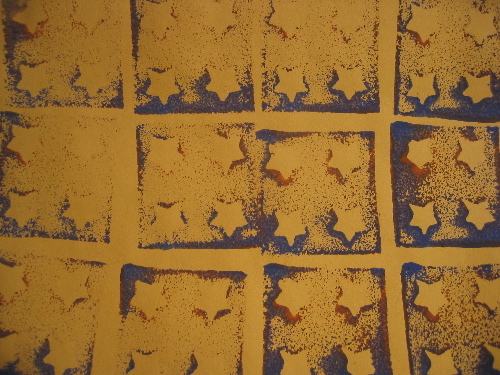
Jace Clayton sends an update, including links to an article of his own. I quote: "The New York Foundation for the Arts Quarterly asked Jace to write an essay exploring ideas in his musical approach. He discusses DJing in the Persian Gulf, Victoria´s Secret supermodels on Moroccan rai bootleg CDs, and more. It´s intended for a general audience."
The general audience is also the target of this newspaper article. Carl Wilson does as good a job as anybody in the lower 48 of making an umbrella piece not feel stretched and patched. (Nice Atwood quote, too.) When Wilson reaches the idea of "lit hop," and wonders why there's no such thing, my response burped out: "There's already a lit-hop. It's called hip-hop." That doesn't mean I disagree with Wilson's take on the relationship between indie rock and its lit cohort.
August 18, 2004
BLENDS, BOOTLEGS AND MASH-UPS: AN INDEX

The Hood Internet boys like indie rock, and they like hip-hop. Aspiring yentas, they make introductions and hope for the best.
Though Freelance Hellraiser got things rolling, Mark Vidler was the Derek Jeter of this game. He's done nothing world-shaking recently, but many of the key songs are still up on his site.
Boomselection is gone. James Hyman and Soundhog are still working. Soundhog is no longer offering the massive “Radio Soundhog Vol.3 - As Heard On...” mix from February 2004, but he still has nuff shots to share.
Optimo continue to operate, and may be the healthiest of this lot. (Look for the "Walkabout" mix CD—legit!) Ultra396 turned to Tone396 and then stopped altogether.
IDC is mostly working as a DJ, it seems. Thee Mightee Osymyso has maintained his site, which still offers tracks, though I don't think any are recent. McSleazy has a streamlined site with many tracks available—in fact, the site mostly just a library now, and that is fine.
Dunproofin' has a couple of really strong boots. Just a few. Not too many. Only a few. This is how it should be. Therefore, we vote Dunproofin' the greatest masher-upper ever.
THE LONELINESS OF THE LONG DISTANCE RUNNER

Now that Fat Joe & Terror Squad are at Number One, here is a stat question for the volunteer army: Has any other rapper had to wait as long for their Number One? Hip-hop is a department where persistence is not often rewarded. Please correct any mistakes—yes, I want you to—and add whoever I've missed.
Fat Joe's first single, "Flow Joe," came out in the fall of 1993, and peaked at 89 on October 9, 1993. Terror Squad's "Lean Back" came out some time in June and hit Number One on August 21, 2004 (or, rather, in the issue dated August 21, 2004).
Jane offers OutKast and Falco:
OutKast's first single, "Player's Ball," was released in January of 1994 and peaked at 37 on May 7, 1994, which is also when it went gold. On February 17, 2001, "Ms. Jackson" hit Number One. That's seven years. "Hey Ya!" hit Number One on December 13, 2003 and then "They Way You Move" hit Number One on February 14, 2004.
"Rock Me Amadeus" peaked at Number One on March 29, 1986, but I have no idea when Falco started rocking the mic.
(All chart positions are for The Billboard Hot 100.)
WAKING UP FOR CHRISTMAS ON THE 26TH

Hardly news to some of you, but some of us have things to do. Audioblogs, like many things, are easily organized and digested through the math of meritocracy. Translation: There aren't that many good ones, and once you find a good one and go through the exhausting get-to-know-each-other's-pipeline session, it isn't that hard to stay on top of things. I am now familiar with Moistworks, with whom I share some preferences and opinions, save for one: Will Smith is a genius MC. Easily Top 20 of all time. Don't agree? Ask Harry Allen.
DUH DOWNLOAD HER

Get on over to the iTunes store and download that PJ Harvey iTunes Originals jawn. There are charming interview bits for the faithful (my hand is raised), but more important is the documentation of her current and very kick-ass live band. (Who knows where this band will be when Island comes around again, right?) Best of the best, you get "Uh Huh Her," a stormer which is not on the album of the same name, you noticed. (PJ's explanation is part of the package.) These songs bring back the sensation of being at the Knitting Factory show in June, which is still the best show I've seen this year. Prince included.
August 17, 2004
THANKS

Thank you to Ange Mlinko for sending me her latest manuscript of poems, which is as consistently pleasing as the weird synthetic blue pillows I got from Bed, Bath and Beyond last week. We recommend her work without reservation. If you want to start somewhere, click on any of these green words, or go for the gusto and get her first book, Matinees. (I encourage you to buy it from SPD or Powell's, but neither have it in stock right now.)
Thank you to Hua for those two Pink Panther-themed mix CDs. He gave them to me months ago but I was a rude bastard and didn't listen to them until last week. They are, as usual, fabulous. (Hua introduced me to Clearlake's "Almost The Same" six months ago, and for that, we have renamed I-95 the Huaway.) Now I know about Claro Intelecto, Extra Produktionen, and the completely genius Red Astaire. Everyone look out for Sticker Shock in the 05.
Thank you to Matthew Ingram for sending me a ripping grime mix CD, unbidden and unannounced. That is some righteous shit. And thank you to grime fans everywhere who emailed to “correct” me and call me a “fucken idiot.” (What a glorious way to spell the word, adding a Middle English whiff to the verb, implying that the act of being fucked is complete and the accused’s lameness is a fait accompli, not an ongoing or fluid process.) You’re right—Mike Skinner, or his character, saw the hair-twirling thing on ITV, not in a magazine. The responsibility for that error is mine alone. As for the repeated messages to “Mrs. Mosley” that hip-hop is “TOTALLY” central to drum & bass, I offer this disagreement: a Winstons break and some Method Man drops does not hip-hop make, any more than a John Denver quote makes dancehall soft Cali rock. Not only does jungle roar along at a completely un-hip-hop-like clip, making the effect and function of the two forms totally distinct, there’s another acute difference that will tip off the close listener that the two genres are only superficially related: the part where nobody’s rapping. Hip-hop is wedded, old school or nu school, to the rapping of words over beats. Jungle has no verses and no hooks—all that yelling is hype man barking, which we love love love, but it is not the same thing as rhyming. (You’d think folks would like having their uniqueness celebrated, but identity is some unique shit.) Witness the fact that drum & bass continued way past the moment hip-hop samples disappeared and was still, correctly, described as drum & bass. The tempo? Still rave. The rhythmic emphasis? Still rooted in dancehall. Feel free to return to fuckenism and Go Home Yankee threats, but we cannot and will not stop. We will always love you.
(Not thanks, but a subtheme that someone can weigh in on: I've gotten three distinct and totally hot grime compilations in the mail from hardcore fans. How come some young millionaire funding a mindie hasn't put out one of these things? God bless Rephlex for adopting early, but that instrumental thing wouldn't convince anyone to stay past the first commercial. When d&b hit, we got a blazing and timely comp from Polygram/London/ffrr, for Hype's sake. Is this failure just evidence of the economy tanking? Is this the electronica dollar gone south? Couldn't DFA or somebody do this? Call Ingram, Jess and Luka, let them each curate a hot biscuit? Come on, trustafarians! Your destiny is waiting!)
Thank you to the mighty Julianne Shepherd for moving to New York, and also for starting a Lauryn Hill newsflash service. Is L boogie buying a Torah? Losing weight? Losing her religion? Tune in for hourly updates.
And thank you to Jennifer Lena for this link. Unlikely to swing Ohio but pressure is pressure.
Here's a small thank you to everyone, which will only seem like a gift if you don't already have it bookmarked and digested:
You can get cute little book summaries from print.google.com, though it isn’t immediately apparent how. I asked the folks at Google, and they told me: “To target your search to Google Print pages only, you can use the 'site:' operator to restrict your search to the Google Print domain, print.google.com. For example, to search for a book titled "Superfudge," you would enter the following in the search box:
site:print.google.com superfudge
And you will get your results.”
Oh—and thank you to Hugo Chávez for being so goddamn gangsta. Fuck 537—you've got millions of chads to burn this time, Georgie.
August 16, 2004
WHY DOES SATURDAY NIGHT LIVE STILL EXIST?

Is there any difference now between traditional TV sketch comedy and, say, a corporation "secretly" enlisting bloggers as promo frontliners, both desperately trying to ride a wave that mocks the very idea of surfing?
TO THE RESCUE

Since s/fj's editor is on some Wilsonian production schedule now, Joe Gross is stepping in with a bite-size theory that will shake your cubicle like Charley and make you throw your shacket high in the air like you just got hitched to an heiress.
Joe Gross:
"So, I had to see Boston for work on Friday, and I had something of a revelation while watching them.
Shellac and Boston are pretty much the same band, to the point where I can't imagine I'm the first person to notice this.
Both are obsessed to the point of mania with sonic perfection (as they understand it) whilst recording albums. Because of said mania, records (and indeed, the band itself) seem to appear on project-to-project basis, often with years between albums.
Both have a dominant personality at their center that the public perceive as the leader/aesthetic figurehead. (In Boston's case, everyone in the band openly acknowledges this. Shellac goes out of its way to deny this, insisting the band is a group effort; nevertheless, the public perception remains.)
Both band's figureheads have outside jobs that involve engineering (Albini's studio and production work; Scholz's patents).
Both assemble the band when they feel like it, tour when they feel like, almost on an ad hoc basis.
Both have a strict moral code when it comes to the presentation of their respective bands, steadfastly ignoring the rules of modern rock/pop, that demand one focus on the music rather than the image, which in turn crates its own anti-image.
Both play through custom built amps their tech-head leader designed and built to exacting specs (or, in Shellac's case, just look like they do.)
Because of their devotion to sonic perfection, the songs end up being this strange abstraction of rock music, as much about the state of rocking as actual rock.
With occasional exceptions, both have a very male fanbase, to the point that the band playing with a woman in its ranks is cause for note and possible concern from the hardercore, more misogynist fans. (Shellac has never had this problem, but in Boston's case, there is an actual woman bass player now, and man, to read some of the 238 reviews on Amazon of the band's last album, some of those male fans are none too happy.)"
August 11, 2004
EMAIL SPAM OF THE NEAR FUTURE
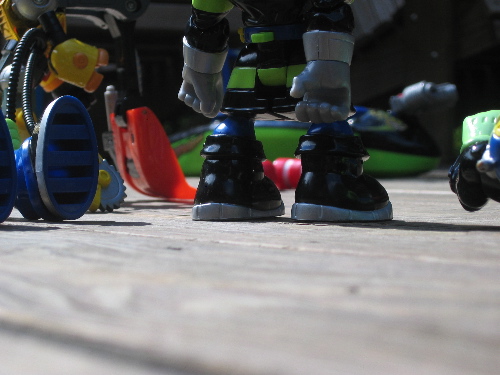
November 5, 2004
DEAR FRIEND OF FREEDOM BORNE ALOFT:
Good morning, young partner of the truth, hero of the American future. I need your help. Because of dark and unsavory forces, I am stranded in a place where America has not prevailed. (I am actually in my own backyard, locked in a personal security space that I purchased from a friend. It was rated as “gently used,” and is in tip-top shape, except for the grab bars, which are slightly sticky. My composition, “Let The Eagle Soar,” is playing on a continuous loop on the in-house speaker system, and the air conditioning doesn’t entirely do what the guy from Halliburton said it would do, but a soldier does not fear things but instead concepts, which are frighteningly conceptual.) We have fallen prey to a leftist, unbirdlike conspiracy called “the election.” Terrifying, earthbound forces have prevented my close co-eagle Tony Scalia from personally counting by hand—like the threadcount of a set of fine sheets—the results of this so-called “election,” a word which itself has a profane ring. Some uninformed, flightless lunatics were recently heard to say that the Emperor of America has been deposed and disgraced. Hearing this calumny, I flew into the bunker and cried tears of freedom and prevailingness. I will remain here, fortified, until such time as someone soars to my side with the true truth clutched in his beak. I know that outside, in the common street, America is not prevailing. America cries. Caw. Caw.
One problem for freedom, and also for me, is that I do not have my bank card with me.
I do have a sophisticated, proprietary channel on a wireless military network, and can load the International Network, repeatedly, without problem, but I am bereft of America’s most eagle-like symbol of freedom: my money. All over the world, in the coffers of the willing and winged, you can find avian bank accounts in my name (or the name of a holding company I cannot be legally linked to). There is a problem, though. I cannot access this money because I do not trust the left-leaning HTML Trotskyites to make the connection between freedom and my weird-looking, bulky military PDA. This is why I need your help, co-babysitter of the eagle. I have credible intelligence that there is money somewhere near you and that, with your help, I can raise the $5,000,000 needed to open my bunker vault. Lost somewhere in the wilds of the weakened and unfree, along with my bank card, are my keys. (They might also be in my left front pocket of my chinos, which are hanging in the guest house bathroom, where America still prevails.)
I am the closest of friends with Emperor of America. We are like two yolks in the lucky, lucky egg of the American Eagle mother. The egg that has not been born yet. The egg will be an eagle one day. Two eagles, actually. Twin eagles. This is how well we know each other. Please keep reading.
Please send me your bank account number and a high resolution picture of you in bathing trunks, perhaps reaching up with both arms extended to a shelf slightly out of reach, and I will make you rich. I play the banjo with my chinny chin chin and can make the girls say Good God Almighty. When I get back to America I will write a song for you called "Mighty Little Lady, Not Unlike An Eagle." (If you are a man, please forward this masculine plea for unity and strength to your closest female friend.) I enjoy candles and long walks in the rain. I am sweating. I do not want to hear my own musical composition any longer.
Do you have fortitude and the courage of your convictions? Have you withdrawn more than 20 dollars from that one ATM you frequent, the one where you buy pre-cut chunks of melon and chat, charmingly, with the cashier about something our omnidirectional microphone could not record? It is just my emotional hunch that you have. Paula Abdul once said I had "soft hands." Oh my! That was not recently. I find popular culture exciting.
You have to give credit where credit is due. I brought back cabaret with that soaring eagle tune. Norah James owes me a hot nickel. When I get out of here, I am going to put the smack down on all these helium-sucking chimpanzees. Real music takes real men, and should be played at ear-splitting volume. I will peel your cap with nothing but pure freedom and my new 4000 watt Freedom Hummer. Lord, it is hot in here. I have no idea what time it is.
Please wire me $45 for a soda. I am not allowed to carry my own money. I don’t know my own phone number. Please, please please ask my undocumented house worker to turn on the A/C in here. All I have to read in here is the Constitution and it is awfully dull.
Soaringly,
John Ashcroft
(Contains a sample from the composition "MESSAGE FROM CURRT ROZENWINKLE," written by S. Frere-Jones, I. Net, K. Rosenwinkle. Performed by s/fj, and published by Abstract Dynamics.)
August 08, 2004
BE WATER, MY FRIEND

My friend Boris Wallon just emailed me about Masta Killa's "No Said Date," an album I assume is mis-titled but which gives me deep and acute pleasure all the same. I was going to tell Boris about it, but then he told me about it. This was surprising to me. This is what Boris said:
Boris Wallon:
Half the reasons to love Masta Killa's "No Said Date" are extra-textual, which is either bullshit or gravy, depending on who you are. Me, there isn't a single day that passes when I'm not leaning more toward backstory as the most important constituent part of an album. (Why should it be, then, that all one-sheets should suck so much ass? A question for another day.) The in-play issues, then, in no particular order and probably leaving a lot of stuff out:
1. Prior to this album, Masta Killa had been the only member of the Wu-Tang Clan not to have released a solo album. Most of the others have at least four. Even Inspectah Deck has three, although normal people, on hearing about the three Inspectah Deck solo joints, will likely respond: "Who?" Wu-Tang heads like to gossip a lot about Masta Killa feeling bitter about his odd-man-out status, but his interviews find him talking a very anachronistic and pleasantly refreshing team-player game: sorta like you might imagine a just-Ringo interview circa 1968, maybe. I had a Jam Master Jay parallel that worked a lot better than Ringo, but thinking about it made me feel sad.
2. Be all that as it may, though, you can only hear so much gossip before it starts to worm its way into your consciousness—which is pretty much the G.O.P.'s whole reelection strategy, from the looks of things (which reminds me: are those Swift Boat Veterans For Truth guys actually Satan, or just Satan's asshole buddies? Please advise). So when you read that some of the songs on "No Said Date" have been sitting in the cans for eight years, you wonder: How come? How come, when Method Man gets away with releasing 74-minute albums that have three stone classic tracks, fourteen more fair-to-good ones, and twenty minutes' worth of wholly forgettable skits? Mustn't there be something to this weakest-link talk that one reads, blushing with shame, on Wu-Tang message boards? Isn't this album gonna suck?
3. And why is the damn thing almost invisible? Search in vain for mainstream press coverage of it. It's on a microscopic label. Even with a cameos from almost every member of the Clan, "No Said Date" has entered the popular consciousness like an extra in a mob scene. This must lend credence to various suspicions, right?
At which point you turn your attention toward "No Said Date" itself, and are shocked and amazed. It's neck-deep in Wu vernacular ("After this drink, we become sworn enemies!"), more recognizably Wu than the solo work of higher-profile Wu stalwarts. The title track flows like an angry Hubert Laws, which you gotta know is awesome if you've been trying to rep for Hubert all these years without success. The beats are freezing cold, except when they're not, as on "Old Man," which, wait for it, features Ol' Dirty Bastard doing his best recollection of the classic McDonalds' quarter-pounder jingle. Over the Sanford & Son theme. Can I get a "fuck yeah"? What's more, the sequence is dazzling. Song after song after song, it's one of the most consistent albums I've heard all year, and its relentlessness sounds — in view of its late arrival, and of its everybody-get-on-board guest spots, and of the bio as received and understood by the making-sense-of-too-much-information Wu massive — like a self-referencing refutation of anything you, or I, might have supposed in advance about it. Which is awesome, and makes it ideal summer listening: it's wistful and hopeful and current and historical all in the same breath.
August 07, 2004
YEAH, RAP SHOWS ARE REALLY AN INSURANCE RISK

Thomas Barthel with the weekend's final baseball story:
"In the 7th game of the 1934 world series, the Cardinals were winning. The Tigers had not scored. Joe Medwick hit a long triple and slid hard—as he always did—into third. He and the third baseman threatened each other, but things settled down and the game went on. In the next inning, Joe went to his left field spot and a fan, furious that they were being humiliated, began to scream "Take him out!" and then started throwing stuff—fruit, pop bottles, milk bottles, anything—at Medwick. This went on for 17 minutes. Medwick refused to move but eventually Commissioner Landis took Medwick out of the game, 'for his own safety,' and the game finished. Medwick had 11 hits at that point and wanted to go for the then-current record of 12 held by his teammate, Pepper Martin."
BLAST IF SHE HAS TO

We want to shout out our friend Elizabeth Méndez Berry, partially for writing the best piece on The Black Album we read, partially for writing this piece, but mostly for just being fierce.
August 06, 2004
WE LOOK FORWARD TO FINDING OUT IF ANYONE ON THE DODGERS USES MAIN SOURCE'S "FRIENDLY GAME OF BASEBALL"

Both Maura Johnston and Drew McDermott sent me this list of songs used as entry anthems by American League batters.
Henry Scollard goes 2 for 2 with this link about a dude finding some of his old baseball cards. I have most of the cards pictured and the very sight of them sets off crazy cortical flavor packets. Like the summer of 1978, when I was still going to Packer Day Camp. I got busted for shoplifting at the Lamston's on the corner of Joralemon and Court, mostly because I was trying to hustle out a very visible forklift of plastic ordnance under my green baseball jacket. Bad move, since I had been successfully boosting Topps rack packs all summer. Escalation—it's a bad look.
Mike Barthel sends a quote from Emmylou Harris, taken from the June 2004 Esquire:
"During those long summer tours, there's nothing on television that doesn't rot your brain except for baseball. And I love the game. I love the history of the game. I love the fact that anything can happen but probably won't. But sometimes does. I love that you don't have to be a perfect human specimen to be a good player; you can be overweight, you can be too short, too skinny. Let's just say that I'm a National League girl, because I don't believe in the designated hitter. And you can quote me on that."
And Thomas Barthel send this summary of the Sir Eugene story:
"Gene Kingsale missed Tuesday's game in order to be knighted in his home country of Aruba, the Associated Press reported. Kingsale was joined by Baltimore pitcher Sidney Ponson and Los Angeles pitcher Calvin Maduro. Sir Eugene should be back in the lineup on Wednesday.
MLB.com's article said that knighthood is usually reserved for 'older Arubans as a sort of lifetime achievement.' However, the article goes on, Aruba's governor, Olindo Koolman, is a 'passionate baseball fan.'"
STRAIGHT OUTTA WESTON

On Tuesday, I got my solitude on and drove into Westport for a Man Alone dinner. I had just begun drinking my drink and reading my book when a man sitting next to me asked me what I was reading.
“Revolutionary road? Is that a book about everybody giving up their cars or something?” The question made me feel warmly towards him.
“No, it’s not,” I said, “though I would like a book like that.”
He gave me a funny look while continuing to smile. He asked what it was about.
I said “It’s about this area, in the 1950’s. Troubled marriage. Great.”
He took the book in both of his hands. His wife smiled nervously at me.
“Why can’t books be nice?” he asked. “Why does everybody have to be depressing?”
I felt like I was talking to my kids or maybe somebody else’s kids, though I’ve never heard a child ask a question that stupid. I had absolutely no idea what to say, so I said, “I don’t know.” I agree with Mr. Hand—“I don’t know” is an extremely satisfying response.
Then I felt small for assuming I was superior. What the fuck do I know about his life? Their life? Nobody has the slightest idea what satellites orbit me or what cables of misery are wrapped around my bumper. People can look at me and think “Look at the fuck. That fucking fuck. What a retarded book. Fiction is dead.” Maybe this couple has gone through mayhem and now they just can’t stand to read anything that rings even the smallest bell. Their batteries could have been run out by grief and disappointment. It’s not like I can’t think of twenty people like that off the top of my head.
The man smiled some more and explained that he and his wife were on vacation from Chevy Chase, Maryland. They had read in a guide book that Martha Stewart liked the restaurant, so they had come to Pane Vino hoping to see her. As if to prove he hadn’t made this up on the spot, the man turned and asked the waitress if Martha Stewart ever came in. Apparently she did, yes. And Don Imus. And Paul Newman. The man mentioned several times that they were disappointed they hadn’t seen Martha, almost as if he was expecting to get a break on the bill. There was some overly long talk of Martha helping out the prison chef. At first I thought the whole Martha thing was low-calorie comedy small talk. I eventually took him at his word.
I had the thing they wanted and could not get. I had seen Martha Stewart a few weeks before at a movie theater in Norwalk. We were going to see “Fahrenheit 9/11.” Stewart was standing in the lobby. It is a small theater, an old school two screen joint, the kind with sticky red carpets. The lobby is well-lit and pretty much the last place you’d hide if you were hiding. Martha was waiting for someone. Nobody was bothering her. She was taller than I expected and had nice legs. She was wearing blue tights, the kind that come down to the knee. (What are those? Workout pants? Clingy Capris?) We’d seen her once before, at this kickass Italian restaurant in South Norwalk, with someone we assumed was her mother. Both times she looked like the saddest person in the world. (I didn’t see Martha in our theater, so I assume she saw “Before Sunset.”)
While watching the movie, I thought of all the corpo villains gamboling amidst the wee privet hedges of DC and then thought of Martha, doing time for something that wouldn’t even make the big boys blink. People probably have all sorts of legitimate reasons for hating Martha. I have never thought about her for more than about twelve seconds. (I was in a hotel and watched her make something out of melon cubes on TV once.) What I think while sitting in the movie theater is that Americans are not disposed to like a successful, rich woman who doesn’t owe her success to a man, especially a woman who made her fortune by making visible some of the invisible work that isn’t even considered work. Martha’s hardly an undocumented nanny with no health care, but don’t make the mistake of thinking her work isn’t classed with the huge black hole of labor that is the “home,” the place you come home to, the place that is never counted.
Yesterday, I took the boys to Carvel. We sat outside with our ice cream. Jonah said the melted blue M&Ms were the ocean and the mountain of butter pecan was the land. Sam kept putting ice cream on his nose and looking at me with his beautiful snaggleteeth and big chrysanthemum face. There was a man sitting next to us with his son. They were both having soft serve vanilla cones with that new fucked up cherry coating bullshit. The father was wearing docksiders with no socks and the boy was wearing shorts with little cowboy boots. I wanted to give the father a clinically effective but harmless sleeping pill and spirit the child away so I could tell him that it’s totally OK not to wear little cowboy boots if you don’t want to.
August 05, 2004
DIAMOND LIFE

Henry Scollard sends these baseball stories:
"1985: All-Star Game, Minneapolis Metrodome. Lou Whitaker (Detroit Tigers), the AL's starting second baseman, forgets to pack his uniform. Since he arrives just before game time, he has to make do with a uniform fashioned from whatever can be purchased at a souvenir stand. The too-tight jersey has his name and number crudely emblazoned on the back with a magic marker. The hat is one of those adjustable ones with a nylon mesh back. This is the same guy who went on the DL in 5 years later after hurting his knee doing the Smurf.
1970: Tigers pinch hitter Gates Brown is called up to bat in the late innings of a game. Brown must have thought he was off the hook, since he was in the middle of eating a hot dog. Instead of putting the snack down, he does what any right-minded individual would do, and stuffs it into his back pocket. He winds up hitting a gapper, and slides into second. Time is called and the trainer runs out to tend to examine the injury that is causing profuse "bleeding" down Brown's left hamstring.
1973: Late in a game in which Nolan Ryan was mowing down the Tigers en route to a no-hitter (this was one of two no-hitters I saw at Tiger Stadium that year; Steve Busby of the Royals threw the other one), first baseman Norm Cash steps into the batter's box with a sawed-off table leg instead of a bat. Cash says something like "I wasn't gonna hit him anyway" to the umpire, who makes him grab a more legitimate piece of lumber."
DRUMMER WANTED
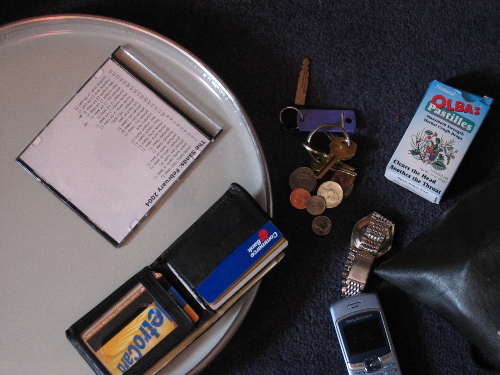
Is there any sadder dyad in the English language? ("Bush re-elected," "dancing outlawed," um. OK, so there are lots.) But The Sands need a drummer. If you enjoy loud rock styles with vocal accompaniment, and songs that get kicked out of bed for going past three minutes, email me. If you can play for reals, email me. I don't mean some Beat Happening/Steve West type chaos—I mean, if you can keep time, hit hard, swing and occasionally get Tastykake on that ass, please email me. If you generally show up anywhere near the specified time, email me. Best of all, you have some audio evidence of your feet and hands at work.
Wait—here are today's sad words: "Begging on the internet."
August 04, 2004
MY GRANDCHILDREN WILL ALL BE NAMED NOMAR AND THAT'S OK

Hello, baseball fans. My son and I are rabid diamondheads, so if you have any baseball-related wisdom to impart, hit us on the email over there. (You will likely guess the teams we root for. Or maybe not.)
I STILL HAVEN'T HEARD BARK PSYCHOSIS

Music Plasma is yet another perfect web fusion of work and not working. I haven't the time or the inclination to check whether the links it finds between groups are useful, but I could see an hour or two going down the rabbit hole before I cared. This link was sent in by Jennifer Lena, who adds another, similar log to the fire:
"Is this Sony thing an example of how copyright and conglomeration can expedite creativity? Or kill it?"
Off the dome: Boy, the Sony thing isn't nearly as fun as the Plasma thing. Boy, the whole gafuffle is just mimicking the lateral action we already get from the web. So, a new jimham has got to be fun to survive, which Plasma is, but it also needs to establish some kind of monopoly to get chosen ahead of some other jimjam, and none of these jimjams will. And I don't think sun and rain go together. OK?
August 03, 2004
ROUNDUP PT. 2
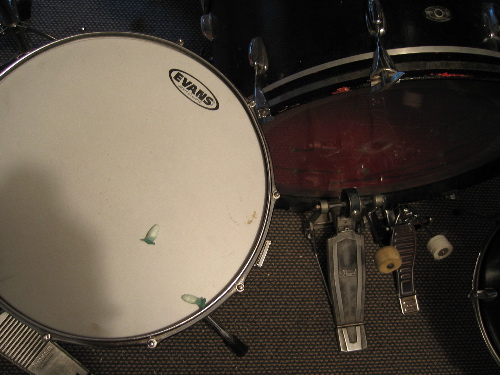
Dizzee Rascal’s “I’m famous and now people are treating me differently” record isn’t annoying. London’s Finest keeps shit moving and takes a pass on the Michael Mann therapy session. DR's got couplets and triplets to drop on your umbrella; the tone and note skills are all Friday to your Monday. Let a man come in and pulverize the pickle.
If you watch the video for “Stand Up Tall,” it looks like Dizzee’s decided to join his friends The American Rapper Guys in their efforts to selflessly support the pole dancing industry. But we see your wily ways, Mr. Video Director. That bobby hat is strictly for export, coming correct to connect at the discotheque like Norman. And transatlantic differences do still obtain: Dizzee is actually dancing WITH the backup dancers. Didn’t anybody tell him RAP IS NO FUN? YOU ARE SUPPOSED TO LOOK COLDLY UPON YOUR DANCERS AND NOD, BUT NO MORE.
Terror Squad: Big points to producers Cool & Dre for the 10 CC sample on “Hum Drum,” one of three keepers on True Story. Points taken off for shameless Neptunes jack on “Let Them Things Go.” (It's "Nothin'" they're biting, and this isn’t the first time Cool & Dre have sold Pharrell tofurky.) We love biting—but bite and improve, bite and evolve, touch your toes and come up strong. Question: We know why Cuban Link isn’t on here, but why couldn’t Joe put a Latina rapper on? Remy’s good and all. Just wondering.
More work for old guys! We were happy to see Terror Squad lace Buckwild with some Universal stock options, and now The Un is keeping The Chocolate Boy Wonder from reminiscing over himself and driving his Volvo around New Ro like Billy Joel. Three tracks on Un Or U Out were produced by Pete Rock and one was even done by Extra P. Sad truth: Beats + rhymes = never enough.
The assignment: Make your band sound like Daft Punk’s Discovery. The grade: weirdly hard to figure out.
I AIN'T NO COWBOY, BUT THIS IS A ROUNDUP

I love big dance bands with percussionists you can't even hear. I love all night all night action action that makes you lose your lose your compass and float on waves of interpersonal radiation. Afrobeat doesn't do that to me. Tony Allen is a monster drummer and the math of afrobeat is pleasantly various. I simply do not funk to it. Afrobeat does not give me that frozen vein feeling and make me miss work because I am at home practicing The Butter Churn and The Ticket Taker. It slows me down, and keeps me in place, a state of being which worried me. I am no longer worried; and I have been having intense interactions with Fela albums. (There are several posts linking to this post that will now make very little sense.) I am also glad that Fela inspired “Remain In Light.”
LL Cool J and Timbaland, "Head Sprung": LL is nice in the verses, finding new ways to lay on a track. (Don't sleep on dude because he was in Rollerball.) The hook is totally corny. And we love corny. But not this corny.
Javine: Don't sleep. (Ha! She's asleep now.)
Young Heart Attack = The Darkness with less yucks and hooks. I like both bands equally. How much is that? If I am in a store and I hear a song playing over the PA, I will stay until it is over. Neither of these bands are as good, or as old, as The Wildhearts. (Poetic punchline: Both YHA and The Darkness are in critical condition. The Wildhearts? Going strong!)
Absolutely not failing me: Anthony Hamilton's Comin' From Where I'm From. His voice makes me so high you could boxcutter a hole in by Bugle Boy jeans, slice my wallet in half, leave a scar on my left buttcheek, and I still wouldn't feel it.
August 02, 2004
NEXT WEEK, HANNITY & COLMES REVIEW NEW MICHAEL MOORE BOOK

Why do I let myself become surprised? Have I learned nothing in the last four years? (Link via Steven Shaviro's blog. Review reproduced below.)
An Antidote to Empire
By FRANCIS FUKUYAMA
Published: July 25, 2004, Sunday
MULTITUDE
War and Democracy
in the Age of Empire.
By Michael Hardt and Antonio Negri.
427 pp. The Penguin Press. $27.95.
Well before 9/11 and the Iraq war put the idea in everybody's mind, Michael Hardt and Antonio Negri had popularized the notion of a modern empire. Four years ago, they argued in a widely discussed book -- titled, as it happens, ''Empire'' -- that the globe was ruled by a new imperial order, different from earlier ones, which were based on overt military domination. This one had no center; it was managed by the world's wealthy nation-states (particularly the United States), by multinational corporations and by international institutions like the World Trade Organization and the International Monetary Fund. This empire -- a k a globalization -- was exploitative, undemocratic and repressive, not only for developing countries but also for the excluded in the rich West.
Hardt and Negri's new book, ''Multitude,'' argues that the antidote to empire is the realization of true democracy, ''the rule of everyone by everyone, a democracy without qualifiers.'' They say that the left needs to leave behind outdated concepts like the proletariat and the working class, which vastly oversimplify the gender/racial/ethnic/ class diversities of today's world. In their place they propose the term ''multitude,'' to capture the ''commonality and singularity'' of those who stand in opposition to the wealthy and powerful.
This book -- which lurches from analyses of intellectual property rules for genetically engineered animals to discourses on Dostoyevsky and the myth of the golem -- deals with an imaginary problem and a real problem. Unfortunately, it provides us with an imaginary solution to the real problem.
The imaginary problem stems from the authors' basic understanding of economics and politics, which remains at its core unreconstructedly Marxist. For them, there is no such thing as voluntary economic exchange, only coercive political hierarchy: any unequal division of rewards is prima facie evidence of exploitation. Private property is a form of theft. Globalization has no redeeming benefits whatsoever. (East Asia's rise from third- to first-world status in the last 50 years seems not to have registered on their mental map.) Similarly, democracy is not embodied in constitutions, political parties or elections, which are simply manipulated to benefit elites. The half of the country that votes Republican is evidently not part of the book's multitude.
To all this Hardt and Negri add an extremely confused theory, their take on what Daniel Bell labeled postindustrial society, and what has more recently been called the ''knowledge economy.'' The ''immaterial labor'' of knowledge workers differs from labor in the industrial era, Hardt and Negri say, because it produces not objects but social relations. It is inherently communal, which implies that no one can legitimately appropriate it for private gain. Programmers at Microsoft may be surprised to discover that because they collaborate with one another, their programs belong to everybody.
It's hard to know even how to engage this set of assertions. Globalization is a complex phenomenon; it produces winners and losers among rich and poor alike. But you would never learn about the complexities from reading ''Multitude.'' So let's move on to Hardt and Negri's real problem, which has to do with global governance.
We have at this point in human history evolved fairly good democratic political institutions, but only at the level of the nation-state. With globalization -- and increased flows of information, goods, money and people across borders -- countries are now better able to help, but also to harm, one another. In the 1990's, the harm was felt primarily through financial shocks and job losses, and since 9/11 it has acquired a military dimension as well. As the authors state, ''one result of the current form of globalization is that certain national leaders, both elected and unelected, gain greater powers over populations outside their own nation-states.''
The United States is uniquely implicated in this charge because of its enormous military, economic and cultural power. What drove people around the world crazy about the Bush administration's unilateral approach to the Iraq war was its assertion that it was accountable to no one but American voters for what it did in distant parts of the globe. And since institutions like the United Nations are woefully ill equipped to deal with democratic legitimacy, this democracy deficit is a real and abiding challenge at the international level.
The authors are conscious of the charge that they, like the Seattle anti-globalization protesters they celebrate, don't have any real solutions to these matters, so they spend some time discussing how to fix the present international institutions. Their problem is that any fixes are politically difficult if not impossible to bring about, and promise only marginal benefits. Democratic institutions that work at the nation-state level don't work at global levels. A true global democracy, in which all of the earth's billions of people actually vote, is an impossible dream, while existing proposals to modify the United Nations Security Council or change the balance of power between it and the General Assembly are political nonstarters. Making the World Bank and I.M.F. more transparent are worthy projects, but hardly solutions to the underlying issue of democratic accountability. The United States, meanwhile, has stood in the way of new institutions like the International Criminal Court.
It is at this point that Hardt and Negri take leave of reality -- arriving at an imaginary solution to their real problem. They argue that instead of ''repeating old rituals and tired solutions'' we need to begin ''a new investigation in order to formulate a new science of society and politics.'' The woolliness of the subsequent analysis is hard to overstate. According to them, the fundamental obstacle to true democracy is not just the monopoly of legitimate force held by nation-states, but the dominance implied in virtually all hierarchies, which give certain individuals authority over others. The authors dress up Marx's old utopia of the withering away of the state in the contemporary language of chaos theory and biological systems, suggesting that hierarchies should be replaced with networks that reflect the diversity and commonality of the ''multitude.''
The difficulty with this line of reasoning is that there is a whole class of issues networks can't resolve. This is why hierarchies, from nation-states to corporations to university departments, persist, and why so many left-wing movements claiming to speak on behalf of the people have ended up monopolizing power. Indeed, the powerlessness and poverty in today's world are due not to the excessive power of nation-states, but to their weakness. The solution is not to undermine sovereignty but to build stronger states in the developing world.
To illustrate, take the very different growth trajectories of East Asia and sub-Saharan Africa over the past generation. Two of the fastest growing economies in the world today happen to be in the two most populous countries, China and India; sub-Saharan Africa, by contrast, has tragically seen declining per capita incomes over the same period. At least part of this difference is the result of globalization: China and India have integrated themselves into the global economy, while sub-Saharan Africa is the one part of the world barely touched by globalization or multinational corporations.
But this raises the question of why India and China have been able to take advantage of globalization, while Africa has not. The answer has largely to do with the fact that the former have strong, well-developed state institutions providing basic stability and public goods. They had only to get out of the way of private markets to trigger growth. By contrast, modern states were virtually unknown in most of sub-Saharan Africa before European colonialism, and the weakness of states in the region has been the source of its woes ever since.
Any project, then, to fix the ills of ''empire'' has to begin with the strengthening, not the dismantling, of institutions at the nation-state level. This will not solve the problems of global governance, but surely any real advance here will come only through slow, patient innovation and the reform of international institutions. Hardt and Negri should remember the old insight of the Italian Marxist Antonio Gramsci, taken up later by the German Greens: progress is to be achieved not with utopian dreaming, but with a ''long march through institutions.''
Francis Fukuyama, a professor of international political economy at Johns Hopkins University, is the author of ''State-Building: Governance and World Order in the 21st Century.''
IT IS TIME FOR THE SHOW
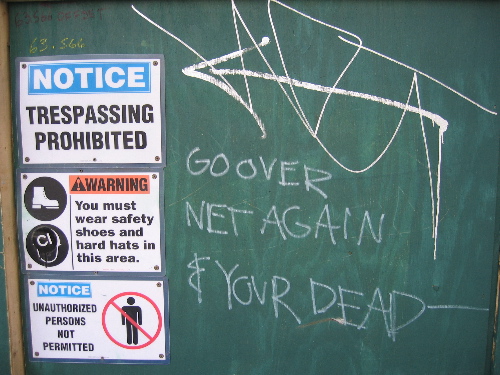
Out with Nina, Hooba and "Singles," in with "Mother Tongue," a piece about Dizzee Rascal and Mike Skinner, a.k.a The Streets.

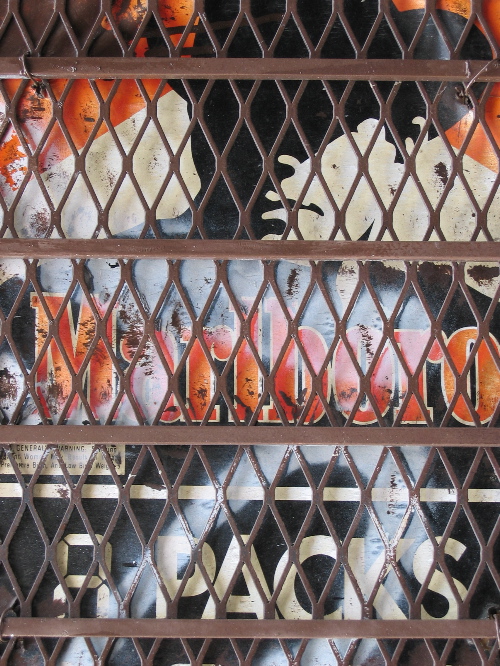




.jpg)
